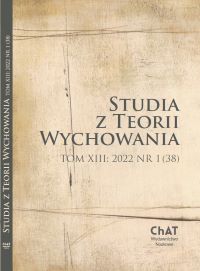Stowarzyszenie Umarłych Poetów – koniec legendy, konieczność rewizji
Dead Poets Society - the end of the legend, the call for revision
Author(s): Michał PaluchSubject(s): Social Sciences, Education
Published by: Wydawnictwo Naukowe ChAT
Keywords: teacher; student; parent; school; ethos; Dead Poets Society; manipulation; pedagogical filmography
Summary/Abstract: The case of John Keating, a charismatic English teacher and students of an elite boarding school (Welton Academy), attracted millions of audiences around the world in front of cinemas and televisions. "And the Oskar goes to ..." was heard in 1990 by the screenplay writer Tom Schulman, and was nominated for Best Picture, Best Leading Actor and Best Director. One of the first Polish reviews of the film took place on Polskie Radio in the same year, during a program hosted by Anna Retmaniak. - "It is a wonderful film" - she informed enthusiastically, adding - "[...] what (the teacher - M.P.) instilled in young people remained in their hearts and minds forever." On the other hand, what this article can "instill" in the minds and hearts of the readers is the increased resistance to the manipulation of the content of the script by the producers of the film and, consequently, a pedagogical deception, which we also fell at our own request. As educators, we have not examined the differences between the original scenario (script) and its subsequent adaptations. It turns out that the narrative of the film is built on the themes of John Keating's fear and dying, and not - as we thought so far - on the phenomenon of his teaching talent. At the same time, we have not indicated cultural differences, resulting in our country's incorrect reception of such categories as: charisma, professional vocation, leadership or elitism. Readers of the book of the same title (Kleinbaum, 2007, 2018, 1st Polish edition 1994) and participants of theatrical performances (dir. P. Ratajczak). The article does not exclude those arguments that credibly argue for the uniqueness and attractiveness of the work. However, in order to understand its phenomenon, it is necessary to analyze the removed fragments of the scenario, revealing the reasons for teachers and candidates for this profession and the effects of the hidden truth. Sprawa Johna Keatinga, charyzmatycznego nauczyciela języka angielskiego i uczniów elitarnej szkoły z internatem (Welton Academy), skupiła przed ekranami kin i telewizorów miliony odbiorców na całym świecie. „And the Oskar goes to…” usłyszał w 1990 autor scenariusza Tom Schulman, a przy tym nominację dla najlepszego filmu, najlepszego aktora pierwszoplanowego oraz najlepszego reżysera. Jedna z pierwszych polskich recenzji filmu odbyła się w Polskim Radiu, tego samego roku, podczas audycji prowadzonej przez Annę Retmaniak. – „Jest to film wspaniały” – informowała z entuzjazmem, dodając – „[…] to, co (nauczyciel – M.P.) zaszczepił młodym ludziom pozostało w ich sercach i w ich umysłach na zawsze.” Natomiast to, co niniejszy artykuł może „zaszczepić” w umysłach i sercach czytelników, to zwiększoną odporność na poczynione przez producentów filmu manipulacje treściami scenariusza a w konsekwencji pedagogiczne oszustwo, jakim padliśmy również na własne życzenie. Jako pedagodzy nie zbadaliśmy różnic między oryginalnym scenariuszem i jego kolejnymi adaptacjami. Okazuje się, że narracja filmu zbudowana jest na motywach lęku i umierania Johna Keatinga, a nie – jak dotąd myśleliśmy – na fenomenie jego talentu pedagogicznego. Nie wskazaliśmy przy tym różnic kulturowych, skutkujących w naszym kraju błędną recepcją takich kategorii jak: charyzma, powołanie zawodowe, liderstwo czy elitarność. Na manipulację skazani są również czytelnicy książki o tym samym tytule (Kleinbaum, 2007, 2018, 1 wyd. polskie 1994) oraz uczestnicy spektakli teatralnych (reż. P. Ratajczak) . Artykuł nie przekreśla tych argumentów, które wiarygodnie przemawiają za wyjątkowością i atrakcyjnością dzieła. Aby jednak zrozumieć jego fenomen należy przeanalizować usunięte fragmenty scenariusza, odsłaniając nauczycielom i kandydatom do tego zawodu przyczyny i skutki skrywanej prawdy.
Journal: Studia z Teorii Wychowania
- Issue Year: XIII/2022
- Issue No: 1 (38)
- Page Range: 51-79
- Page Count: 29
- Language: Polish

